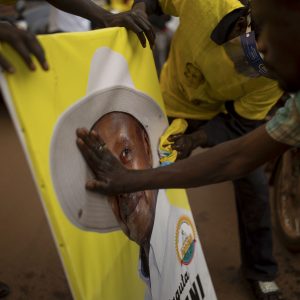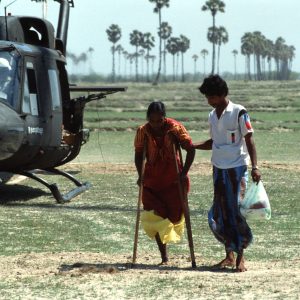Divided Ugandans speak out after Museveni win
The president of Uganda bagged his sixth term after an election outcome that has been widely regarded as unsurprising, but citizens are already asking who will take over from him.
Author:
25 January 2021

Ugandan President Yoweri Museveni, 76, is the third-longest actively serving head of state in Africa, having been in power for more than three decades. The Electoral Commission of Uganda announced his re-election by just less than 59% of the votes on 16 January, cementing another five-year stay in power for him and his party, the National Resistance Movement.
Echoing Museveni’s assertion in his post-victory speech that this had been the “most cheating-free” poll in the country’s history, 35-year-old Ugandan citizen Susan Nimusiima says it has indeed been the fairest. Nimusiima is from Mbarara in western Uganda, a city close to Musenevi’s birth district of Ntungamo, and is also from the same ethnic group. Although there wasn’t a heavy military presence in the area because it supported Museveni, there was an unwritten rule to remain at home after casting a vote in case anything went wrong.
“People are happy that [Museveni] has won, but there are questions of transition,” she said. “He is an ageing man. What next, what happens when he can no longer be the leader? Who will take over, how will he handle these ethnic tensions, will we be able to survive the transition? We are facing all those questions and we don’t have answers … but we are hoping the best comes out and we get a good leader and the country goes forward.”
Related article:
Arthur Oyako, 34, a former journalist and communications officer based in Kampala, said he had hoped this election would produce an undisputed outcome. “I went in hoping that maybe there would be a good change. Every election since 1996 has always ended up in the courts,” he said.
But deep down, Oyako had a feeling Museveni would remain in power. And that the strongest opposition contender, Bobi Wine, is still under house arrest shows him that not much has changed. For more than a week now, Wine has been confined to his home, which is surrounded by armed forces. A United States ambassador was denied access when he tried to visit Wine on 19 January. On 25 January, the Uganda High Court ruled that the army must vacate his house.
A country divided
Oyako said it’s still too early to tell the mood on the ground because it takes time for the “results and the rigging to sink in”, but people in his suburb have chosen to move on from the election. He said, however, that the country remains deeply divided.
“You have old people who experienced the years before Museveni came into power, and every time they see the army patrolling or helicopters hovering they believe that Museveni has given them a semblance of peace. And they think, ‘If we vote otherwise, we could go back to the days of insecurity,’” he said.
The November protests that broke out after Wine’s arrest also made people fearful of the government reverting to the violent practices of those past regimes, and many did not support Wine taking over based on this, Oyako added. The deaths of at least 54 people in the riots have still not been investigated.
Related article:
Nimusiima says people feel differently about the election in different regions, particularly in Buganda, the central region from which Wine hails. “In Buganda … there is a little bit of tension. People are blogging online that Bobi Wine must be released. Of course, part of the reason for the house arrest is so he is not able to mobilise and organise riots. So in Buganda, the feeling is that this is not over. But on this side, the feeling is that of relief. We can breathe for another five years, but we need to start asking ourselves who is next to take over,” she said.
The shutdown of the internet for five days has been lifted, but people were unable to access their bank accounts or communicate with their loved ones while it was in place. Those who claim electoral fraud, including Wine, have said they will post evidence on social media once access to these platforms is restored as well.
“Both sides had a lot of agents with fake accounts organising everybody [on social media], so it was kind of heated before elections. But once there was an internet shutdown, people were able to vote and go back home,” said Nimusiima, adding that life was slowly returning to normal.
Regional bias
Voting in the election was divided along ethnic lines, with people choosing leaders from their regions, says Nimusiima. Her preferred candidate had been Mugisha Muntu, but she feared he wouldn’t make it so she voted for Museveni, and many of her friends did the same.
“In Mbarara, as a city, we were previously divided between former candidate Kizza [Besigye] and the current president. This time the sentiment was that we must not get [Wine] into power for the basic reason that he is really not ready for leadership. Also, there was a lot of ethnic hostility towards us as a region because of the incumbent’s long stay in power, so the feeling was we should not let [Wine] get into power. Even people who had previously not voted for the incumbent went to go and vote for him,” said Nimusiima.
Author Lyn Ossome, a senior research specialist at the Institute for Economic Justice in Johannesburg, contends that although not overt, “there is an ethnic struggle at the heart of Ugandan politics. This is part of the expectation and constant failure of … political competitions structured around a liberal democratic system, that we buy into the narratives of free and fair,” said Ossome.
“What is free and fair when we are not addressing the claims [made by the opposition]? People continue to vote because there is something at stake for them. Young people don’t vote because they are young, they vote because there is something at stake for them.”
Related article:
Ossome says the liberal democratic system is a fairly unstable way of determining outcomes in countries that are still dealing with the legacies of colonialism. “Those legacies include questions of ethnicity, what we call politicised ethnicity. They include gender and gendered violence, racism, violence and so on. Every context has to be understood in terms of its own history.
“We have to take the structural legacies of colonialism seriously because they continue to determine our electoral outcomes in many parts of the continent, and Uganda is no exception. Part of our concrete duty and responsibility is to expose this system that is embedded in the liberal democratic notion of politics, which we see in country after country on the continent is just not a fair way of determining political outcomes, especially for those on the margins,” said Ossome.
Not ready to lead
Nimusiima says Wine’s political rhetoric has included him saying he is going to chase people out of certain areas, which will include refugees who have bought property and settled in Uganda. “If you know the history of Uganda, [these areas are] hosting many refugees who have settled and married here. You cannot say you will chase them [away]. You are going to break up families if you are going to do that. He is playing on sentiments that have high emotions around them and will create victims of people who are innocent,” she said.
This, Nimusiima says, strengthens her argument that Wine is not ready to lead. “He has only spent a few years in Parliament. He won a by-election and he took on the mass appeal of being a pop musician. He had no agenda for the nation. When faced with questions of his agenda for the nation, he has no answer [and] would refer to the incumbent’s programme. He knows nothing about leadership. He is good at mobilisation, he’s good at appealing to masses, but he honestly doesn’t know much about leadership and does not understand how the economy works. So yes, he is loved. Yes, he is supported. But honestly, as a leader, he is not ready to take on power.”
Related article:
Although Wine did not win, more than 3.4 million people voted for him. And Museveni lost in Buganda for the first time since multiparty elections were introduced, which is a significant outcome. Ossome says Wine’s number of votes has usually been the opposition threshold, but his failure to deal concretely with the rural-urban question as well as questions on land and peasants is part of the reason for his loss.
“A largely urban campaign is fine, but if you are going to wage a campaign on it and your agenda is simply to remove a dictator, it is not an agenda. Winning a popularity contest on social media is very different from building a local and popular base. In Uganda, the person who would be able to do that is the person who can command – politically and economically – the peasantry, the rural population and urban, semi-proletarianised population with important links to rural Uganda,” she said.
Flaws of social media
There has been a lot of talk about Wine’s large social media following not translating into votes, and Ossome says one cannot depend on the medium as a political tool.
“That’s a really important point. You cannot depend on a medium you cannot control. If you don’t control social media, you cannot depend on it. Look what happened … Bobi Wine has been relying on foreign journalists to get word out. There is a class question with social media. Accompanying that land question is this rural-urban divide and again, this goes back to historical context. Uganda is a largely agrarian society. When Museveni came into power in 1986, the peasant base was his strongest base and he understands this.”
Ossome says she has not been surprised by either the violence that accompanied the election or its outcome, particularly that the “regime would resort to these kinds of tactics, including the unlawful incarceration of the main opposition leader”.
“You need the political legitimacy to govern. If there is a significant [part of the] population that feels disenfranchised, we have to ask ourselves where it is leading,” she said.
Related article:
In a virtual meeting on South Africa’s roles chairing the United Nations Security Council and African Union on 20 January, Naledi Pandor, the country’s international relations and cooperation minister, said no statement had been issued on the Ugandan election results. She said the government was “loath to make a quick judgement” and paying close attention to the situation in Uganda.
“President [Cyril] Ramaphosa, as chair of the African Union, is in communication with President Museveni, and we hope that that country will attach to democracy and freedom and that some of what we are seeing in the media will come to an end,” she said.





